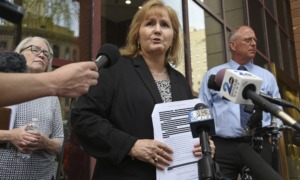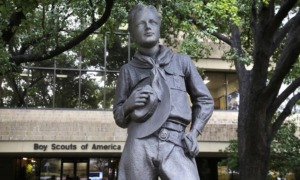
“Think of the children!”
Among the many people who wail this admonishment when they have nothing useful to say in an argument is a cartoon: Helen Lovejoy of The Simpsons, who, in midst of raucous public debates about such civic crises as high taxes and bear attacks, stands hands on cheeks imploring the crowd to remember what’s important:
Homer: Mr. Mayor, I hate to break it to you, but this town is infested by bears! …
Helen: Think of the children!
 Helen’s cry bellowed from the Boy Scouts of America and the Catholic Archdiocese of Atlanta last month, as they begged Georgia lawmakers to save children from legislation that threatened to expand the rights of sex abuse victims to win lawsuits over their abuse. The bear prowling the State Capitol was the Hidden Predators Act, which as passed by the state House would give survivors of childhood sexual assault up to age 38 (versus 23 under the current statute of limitations) to sue alleged perpetrators and the entities for which the offenders worked or volunteered. Lobbyists for the BSA and the Church ran arms a-flailin’ to the shelter of the state Senate, which passed a version of the act that shrinks the statute of limitations to age 30 and makes it much more difficult for victims to sue organizations.
Helen’s cry bellowed from the Boy Scouts of America and the Catholic Archdiocese of Atlanta last month, as they begged Georgia lawmakers to save children from legislation that threatened to expand the rights of sex abuse victims to win lawsuits over their abuse. The bear prowling the State Capitol was the Hidden Predators Act, which as passed by the state House would give survivors of childhood sexual assault up to age 38 (versus 23 under the current statute of limitations) to sue alleged perpetrators and the entities for which the offenders worked or volunteered. Lobbyists for the BSA and the Church ran arms a-flailin’ to the shelter of the state Senate, which passed a version of the act that shrinks the statute of limitations to age 30 and makes it much more difficult for victims to sue organizations.
This killing of a child protection law shows that although the BSA and the Church have made enormous strides in preventing and reporting sex abuse in recent years, their corporate leaders still cloak themselves in their cause to deflect accountability to victims.
During the Predators Act battle, the BSA said it “strongly supports” much of the House bill — just not the parts that might involve the BSA, namely, “provisions that would hinder the ability of youth-serving organizations to protect the children they serve.” It seems that defending against more lawsuits and paying damages would leave the BSA no choice but to take money from its programs for youth.
Because the BSA thinks of the children first.
Such thinking goes way back. For most of the 1900s, it helped BSA professionals around the country convince victims’ families, police and prosecutors to let molesters go free with no charges, to avoid publicity. In 1978, for example, a scout executive in Massachusetts told BSA headquarters that a family had “fortunately” decided not to press charges against a volunteer leader who confessed to molesting a Scout. The executive later told me he was grateful that parents contemplating prosecution in abuse cases “were aware they’d be in the public limelight, and their kid would be embarrassed.”
Think of the children’s embarrassment, so sex abuse statistics might plummet.
When families took legal action through lawsuits, the BSA settled some with gag orders prohibiting the families from discussing the cases with the media. When I suggested in 1990 to the BSA’s second in command — Director of Administration Joseph Anglim — that the BSA forced silence on families to protect its reputation, Anglim insisted au contraire: “Our interest is to protect the kid” from harmful publicity.
Think of the children’s legal liabilities, so they won’t blab about their abuse.
When lawsuits in the 1980s and 1990s sought to pry open the BSA’s so-called Confidential Files on people kicked out of Scouting for alleged abuse, the BSA argued that the files hold personal information that would embarrass victims as well as alleged-but-unconvicted suspects. True. But literally blacking out those names — which an Oregon court ordered when releasing 1,200 of the files in 2012 — did not stop the corporation from thinking about the children. It said the release even of redacted files “may still negatively impact victims’ privacy and have a chilling effect on the reporting of abuse.”
Yet somehow, the more people learn about sex abuse in youth-serving institutions — Scouting, the Church, schools, gymnastics teams — the more that other victims come forward.
One of those victims called me at Youth Today one day in the early 2000s to say my reports on abuse in Scouting changed his life.
Matthew and his brother were molested by a Scout leader in Seattle, but kept largely quiet for decades — until they read media reports about the extent of abuse in the Church and Scouting, and about the organizations’ efforts to hide it. They sued the Scouts and their molester, and won a settlement. Most importantly, Matthew said, they won peace in seeing they were not alone and that justice was meted out to those who hurt them.
Sometimes it takes decades for abuse victims to come forward. Until they do, they don’t know if an organization did what it should to protect them. Finding the truth, telling their stories and holding perpetrators accountable heals many victims in ways that nothing else can.
Remember those children.
Patrick Boyle is the former editor of Youth Today and author of numerous reports about sex abuse in Scouting, including the book Scout’s Honor.































